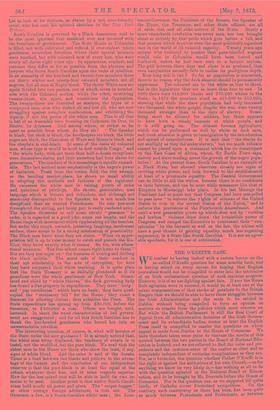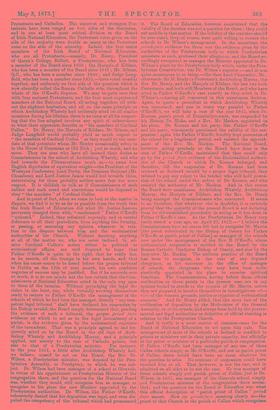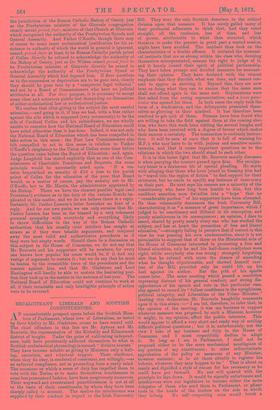TEE O'KEEk'FE CASE.
WE confess to having looked with a certain horror on the so-called O'Keeffe question for name months back, and to having seized on every excuse for hoping that English journalists would not be compelled to enter into the intricacies of an Irish ecclesiastical question of such. ominous auspices. However, it is of no use fighting against fate. If ever the Home Rule agitation were to suceeed, it would be at least one of the minor compensations of that stroke of paralysis to the British Empire that we should be able to leave these struggles between the Irish Administration and the sects to be settled in Dublin, without being compelled to form an opinion on matters so remote from the politics which most concern us. But while the British Parliament is still the final Court of Appeal from all administrative decisions of the Irish Govern- ment and its subordinate bodies, sooner or later the English Press itself is compelled to master the questions on which appeal is made from Dublin to the House of Commons. We have therefore taken some pains to canvass the merits of this quarrel between the two parties in the Board of National Edu- cation in Ireland, and we are relieved to find the rules and pre- cedents and the common-sense of the matter so clear and so completely independent of sectarian complications as they are. For, as it turns out, the question whether Father O'Keeffe is in the right as against the authorities of his own Church,—as for anything we know he very likely is,—has nothing at all to do with the question agitated in the National Board of Educe- cation, and to be brought by Mr. Bouverie before the House of Commons. Nor is the question one, as we supposed till quite
lately, of Catholic versus Protestant sympathies. On the contrary, such controversy as there has been, has been quite as much between Protestants and Protestants, as between
Protestants and Catholics. The sincerest and strongest Pro- testants have been ranged on both sides of the discussion, and in one at least most critical division in the Board of Irish National Education, the Protestant votes given on the side of the majority were double as many as the Protestant votes on the side of the minority. Indeed, the four senior members of the Irish Board of National Education, who are all Protestants,—namely, Dr. Henry, President of Queen's College, Belfast, a Presbyterian, who has been a member of the Board since 1838 ; the Marquis of Kildare, who has been a member of the Board since 1811 ; Mr. Gibson, Q.C., who has been a member since 1848; and Judge Long- field, who has been a member since 1853,—have voted steadily together, and uniformly on that side of the question which is now absurdly called the Roman Catholic side, throughout the whole of the O'Keeffe disputes. We may be quite sure that with four eminent Protestants, and the four most experienced members of the National Board, all acting together, all with- out the slightest hesitation, and all on the same principle on which Archbishop Whately had uniformly acted on all similar occasions during his lifetime, there is no room at all for suspect- ing that the line adopted involves any spirit of subserviency to what their opponents describe as "the niandate of Cardinal Cullen." Dr. Henry, the Marquis of Kildare, Mr. Gibson, and Judge Longfield would probably yield as much respect to "the mandate of Cardinal Cullen" as they would to the man- date of that potentate whom Mr. Henley occasionally refers to in the House of Commons as Old Nick ; just as much, and no more. They are men who have all learned their duties as Commissioners in the school of Archbishop Whately, and who feel towards the Ultramontanes much as,—to name four English dignitaries of equivalent weight—the President of the Wesleyan Conference, Lord Derby, the Common Serjeant (Mr. Chambers), and Lord Justice James would feel towards them, entertaining for them probably neither more fear nor more respect. It is childish to talk as if Commissioners of such calibre and such creed and convictions would be disposed to obey "the mandate" of Cardinal Cullen.
And in point of fact, when we come to look at the matter in dispute, we find it to be as far as possible from the truth that the Irish Board of Education did what Mr. Justice Lawson perversely charged them with, " condemned " Father O'Keeffe "unheard." Indeed, they refrained expressly, and in careful deference to all their precedents, from anything like forming, or passing, or assuming any opinion whatever in rela- tion to the dispute between him and the ecclesiastical authorities of his Church. Without knowing anything at all of the matter we, who are never inclined to ad- mire Cardinal Cullen's action either in political or ecclesiastical affairs, are well disposed to hope that Father O'Keeffe is quite in the right, that he really has, as he asserts, all the trumps in his own hands, and that when his cause comes to be heard before the proper tribunal in Dublin on the 12th of next month, his own confident auguries of success may be justified. But if he succeeds ever so much, it is to our minds not the less certain that the Com- missioners of National Education acted in the only way open to them irf the interim. Without prejudging the legal de- cision in the least, nay, while virtually avowing themselves ready to restore to Father O'Keeffe the management of the schools of which he had been the manager, directly "any com- petent legal tribunal" shall have declared his suspension by his Bishop invalid, the Board simply determined that, pending the evidence of such a tribunal, the proper prinui facie evidence on which to act as to the legal incumbency of a parish, is the evidence given by the ecclesiastical superiors of the incumbent. That was a principle agreed to and fre- quently acted on by the Board in the old days of Arch- bishop Whately and Archbishop Murray, and a principle applied, not merely to the case of Catholic priests, but
also to that of a Presbyterian minister. For instance, in the year 1851, a little after Archbishop Whately had, we believe, ceased to act on the Board, the Rev. Dr. Wilson, a Presbyterian minister, was deposed" by the Pres- byterian Assembly, or Presbytery, to which he was sub- ject. Dr. Wilson had been manager of a school at Glenvale, in virtue of his appointment as Presbyterian Minister of the congregation there, and the question for the National Board was, whether they would still recognise him as manager, or recognise in his place the new Minister appointed by the Presbyterian authorities. Dr. Wilson, like Father O'Keeffe, vehemently denied that his deposition was legal, and even dis- puted the competency of the tribunal which had pronounced
I it. The Board of Education, however, maintained that the validity of the decision was not a question for them ; they could not meddle in that matter. If the validity of the sentence should be over-ruled, they, of course, were quite willing to restore the schools to Dr. Wilson's management. In the meantime, the 1w/7nel-facie evidence for them was the evidence given by the authorities of the Presbyterian body to which Presbyterian ministers, as such, professed their allegiance; and the Board ac- cordingly recognised as manager the Minister appointed in Dr. Wilson's place by the Presbyterian body which, under the Pres- byterian Constitution, was Dr. Wilson's superior ;—and it.was quite unanimous in so doing,—the then Lord Chancellor, Mr., afterwards Sir M. Brady (a Protestant), Archbishop Murray, the Her. Dr. Henry, and the Marquis of Kildare, the last two both Protestants, and both still Members of the Board, and who have acted in Father O'Keeffe's case exactly as they acted in Dr. Wilson's,—having all concurred in this unanimous decision. Again, to quote a precedent in which Archbishop Whately was concerned, and one in every way parallel to Father O'Keeffe's, we will take a case of the year 1815, when Dr. Keenan, parish priest of Drumballyrowney, was suspended by his Bishop, Dr. Blake, and a Rev. Mr. Macken appointed in his place. Dr. Keenan and his party, like Father O'Keeffe and his party, vehemently questioned the validity of the Ms.. pension ; again like Father O'Keeffe, forcibly kept possession of the school for a lengthened period, and resisted the appoint- ment of the Rev. Mr. Macken. The National Board, however, acting precisely as the Board have done in the case of Father O'Keeffe, maintained that they could only go by the priind fade evidence of the Ecclesiastical authori- ties of the Church to which Dr. Keenan belonged, and therefore, till the suspension of Dr. Keenan had been reversed or declared invalid by a proper legal tribunal, they refused to pay any salary to the teacher who still held posses- sion of the school under the orders of Dr. Keenan, and who resisted the authority of Mr. Macken. And in this course the Board were unanimous, Archbishop Whately, Archbishop Murray, the Marquis of Kildare, and the Rev. Dr. Henry being amongst the Commissioners who concurred. It seems to us, therefore, that whatever else is doubtful, it is certainly proved that the majority of the present Board is not deviating from its old-established precedents in acting as it has done in Father O'Keeffe' S case. As the Presbyterian Dr. Henry very justly stated a year ago, on April 23, 1872,—" I believe the Commissioners have no course left but to recognise Mr. Martin [the priest substituted by the Bishop of Ossory for Father O'Keeffe as parish priest of Callan] as manager of the schools now under the management of the Rev. It. O'Keeffe, whose ecclesiastical suspension is notified to the Board by the Roman Catholic Coadjutor Bishop of Ossory, and also by the Inspector, Mr. Harkin. The uniform practice of the Board has been to recognise, in the case of any deposed clergyman, as his successor in the office of manager- of schools, the clergyman who may have been eccle- siastically appointed in his place to exercise spiritual functions. The Commissioners, having before them official notification on these points in the present case, are in my opinion bound to accede to the request of Mr. Martin, unless they are prepared to involve themselves in investigations 111bYt Vi ITS' of the reasons, grounds, justice or injustice of ecclesiastical censures." And Dr. Henry added, that the mere fact of the notification of deposition by the Moderators of the General Assembly, or of its synods, had always been held by the govern- mental and legal authorities as definitive of official standing in relation to the Presbyterian Church.
Aid it really is a mere matter of common-sense for the Board of National Education to act upon this rule. The management of most of the schools in Ireland is confided to. priests or ministers not in their private capacity, but officially as the priest or minister of a particular parish or congregation. If Father O'Keeffe had been manager of any one of these Callan schools simply as Mr. O'Keeffe, and not as parish priest of Callan, there would have been no room whatever for the question to arise. No sentence of suspension could have touched him at all. That, however, is not the case, and is admitted on all sides to be not the case. He was manager of
these schools simply pal parish priest of Callan, just as Dr. Wilson, in 1851, was manager of the Glenvale school, simply qua Presbyterian minister of the congregation there assem- bled; and the question for the Board of Education was, what this official description of "parish priest of Callan" primd facie meant. Now its prim4-facie meaning clearly is—the priest of that Church in the parish of Callan which recognises the jurisdiction of the Roman Catholic Bishop of Ossory, just as the Presbyterian minister of the Glenvale congregation clearly meant prima facie, minister of that Church at Glenvale, which recognised the authority of the Presbyterian Synods and General Assembly. And Father O'Keeffe, though there may of course be some inner ecclesiastical justification for his re- sistance to authority of which the world in general is ignorant, ceased, primel facie at least, to be Roman Catholic parish priest of Callan directly he refused to acknowledge the authority of the Bishop of Ossory, just as Dr. Wilson ceased prindi facie to be Presbyterian minister of Glenvale directly he ceased to acknowledge the authority of the Presbyterian Synod or General Assembly which had deposed him. If finer questions as to the suspension or deprivation are to be gone into, clearly they should be gone into by a "competent legal tribunal," and not by a Board of Commissioners who have no judicial attributes at all. For their purpose, it is necessary to accept some clear and notorious public test demanding no discussions of either ecclesiastical law or ecclesiastical justice.
We confess that after giving to the subject the most careful attention,—and going to it, if bias we had, with a bias rather against the side which is supposed (very erroneously) to be the aide of Cardinal Cullen and his subordinates, we are wholly unable to conceive how the National Board of Education could have acted otherwise than it has done. Indeed, it was not only the National Board of Education which has been compelled to take action in this sense ; the Poor Law Commissioners also felt compelled to act in this sense in relation to Father O'Keeffe's chaplaincy to the Union of Callan some time before the question came before the Board of Education ; and, again, Judge Longfield has stated explicitly that as one of the Com- missioners of Charitable Donations and Bequests, the same principle would be necessarily acted upon. "If a tes- tator bequeathed an annuity of £50 a year to the parish priest of Callan for the education of the poor, that Board would, as a matter of course, pay the annuity not to Mr. O'Keeffe, but to Mr. Martin, the administrator appointed by the .Bishop." There we have the clearest possible legal (and Protestant) evidence as to the duty of the various Boards im- plicated in this matter, and we do not believe there is a reply. Certainly Mr. Justice Lawson's letter furnishes no hint of a reply. And for our own parts, we can only surmise that Mr. Justice Lawson has been so far biassed by a very vehement personal sympathy with everybody and everything likely to throw difficulties in the way of the Roman Catholic authorities, that his usually clear intellect has caught at straws as if they were tenable arguments, and conjured away the most valid and authoritative precedents as if they were but empty words. Should there be a discussion on this subject in the House of Commons, we do not say that Mr. Bouverie and his supporters will be nowhere, for every one knows how popular his cause would be, if it had any vestige of argument to sustain it ; but we do say that he must be beaten by the irresistible force of the precedents and the reasons against him, and that Mr. Gladstone and Lord Hartington will hardly be able to sustain the hesitating posi- tion they took up in the matter in the autumn of last year. The National Board of Education could not continue to work at all, if their invariable and only intelligible principle of action were to be reversed.




































 Previous page
Previous page